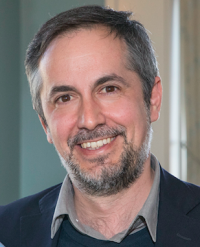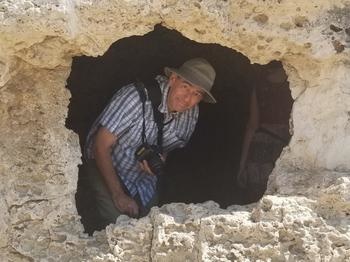An archaeology dig in Sicily…performances of Shakespeare’s work…learning about Spain’s culture through conversations with Spaniards…all from the comforts of home. These experiences represent a small sampling of what students can expect from virtual study abroad course offerings this summer.
The courses, led by UI faculty members, illustrate a bright spot of the COVID-19 pandemic—innovation through necessity. Student interest in learning about the world around them hasn’t diminished just because international travel isn’t possible at the moment. A growing group of faculty members has accepted the challenge to create virtual study abroad courses that allow students a rich learning experience—often featuring small-group discussions with in-country experts and scholars, hands-on cultural activities, livestreamed performances, and guided tours of historical sites.
There are nine such courses being offered during the Summer 2021 session:
- A Virtual Literary Tour of Madrid (Spain)
- Crossroads of the Mediterranean: Exploring the Archaeology of Sicily (Italy)
- Shakespeare’s England (United Kingdom)
- The Art of Collaboration (various)
- Virtual Abroad Experience: Cultures of Spain (Spain)
- Virtual Brazilian Carnival: Music and Dance (Brazil)
- Virtual International Business in Italy (Italy)
- Virtual International Medicine (Dominican Republic)
- Women’s Empowerment in the Dominican Republic (Dominican Republic)
In addition to learning about course content, there is an increased focus on connecting UI students with individuals in the targeted geographic location to learn their perspectives on the topic being studied. “These virtual study abroad offerings get at the heart of what we do—global connection and just connection, period. And during the pandemic it feels even more valuable,” says Leslie McNeilus, study abroad advisor and program coordinator.

Luis Martín-Estudillo
Luis Martín-Estudillo, professor in the Department of Spanish and Portuguese, will be teaching Virtual Abroad Experience: Cultures of Spain—a course he transformed to the virtual format after teaching it on location in Spain for many years. “I have taught courses abroad for many years, and I always made sure that my students felt intellectually and emotionally engaged with the locations we visited. We explored history, art, and culture by visiting cities, palaces, museums, and markets. In those places we encountered many nice people and occasionally chatted to them, but we could not take hours of their time to bomb them with questions,” says Martín-Estudillo. For his virtual course, students will have ample opportunity to interact with Spaniards of different generations and backgrounds. Martín-Estudillo added, “Students will meet people they might have never encountered otherwise--and who knows what kind of additional opportunities that can create! I think this experience will really sharpen the students' cross-cultural communication skills.”

John D’Agata
The Art of Collaboration course taught by John D’Agata, professor of English, provides another example of opportunities given to students to meaningfully interact with others. “This summer I wanted to try to continue turning the restrictions of the pandemic into a positive. So I proposed the idea of connecting UI students with young artists abroad with whom they could work on a collaborative project via Zoom,” says D’Agata. “The idea is that while the students are regularly meeting with their international peers on an individual project, we'll be discussing in class the spectacular history of collaborative art projects in a variety of media: film, painting, dance, music, sculpture, fashion, writing, etc.”

Glenn Storey
Glenn Storey, associate professor of classics and archaeology and instructor of Crossroads of the Mediterranean: Exploring the Archaeology of Sicily, discovered unexpected benefits to the virtual course format. Like Martín-Estudillo, Storey adapted a course he previously taught abroad to the virtual offering. The virtual format will allow Storey to provide students with two experiences that wouldn’t happen in the field. First, students will have the unique opportunity to observe Storey analyzing radar data from his ground-penetrating radar system—a tool considered to be the future of archaeology—in real-time via screen share. Second, the virtual format lends itself well to live viewings of Storey’s field director analyzing physical artifacts at a local museum. In both instances, students get a real-time experience and can see everything that is happening (rather than crowding around a small laptop or workspace on a dig site).
Storey has also been inspired by the flexibility to devote more class time to Italian culture through readings, film, and opera viewings. Students will also have access to an award-winning chef. “There will be a cooking demonstration by Baronessa Giovanna Tornabene who was a two-time James Beard cookbook award winner,” says Storey.

Blaine Greteman
Associate Professor of English Blaine Greteman feels the virtual format begs the question of how and why particular places matter to us. “That’s why we are reading a series of plays by Shakespeare where the City of London, its suburbs, and the surrounding English countryside are all ‘characters’,” says Greteman. “We’re going to be watching some fabulous performances of Shakespeare’s plays, and we’ll talk with staff at the Globe Theatre, in London, who helped to stage and conceptualize them. I think it will be a real highlight of the class.”
In addition to the intriguing learning opportunities in terms of course content, delivery, and meaningful interaction with individuals from all over the world, the virtual study abroad courses offered by UI faculty this summer are resume-worthy and are comparable to the cost of a summer course on campus to boot. “Summer courses at the UI don’t always have financial aid opportunities, but with our virtual summer courses, students can apply for need-based grants, Gilman scholarships, and Diversity Ambassador scholarships,” reports Ana Jimenez, study abroad advisor and program coordinator. “During the time of Covid, you can’t study abroad physically, but you can still benefit from interaction with locals, guest speakers, and virtual tours.”
Application deadlines range from March 15-April 15, 2021. To learn more about these exciting course offerings, click here.